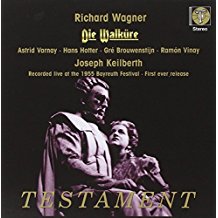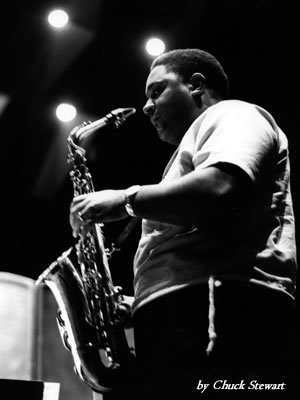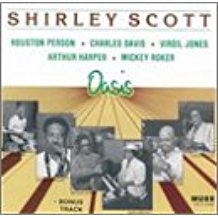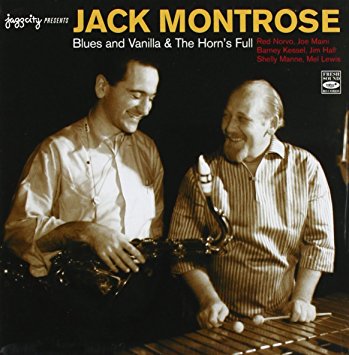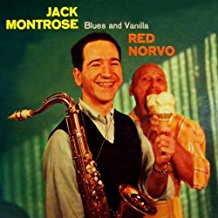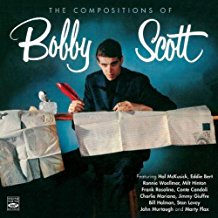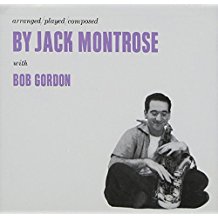-
Posts
13,205 -
Joined
-
Last visited
-
Donations
0.00 USD
Content Type
Profiles
Forums
Events
Blogs
Everything posted by Larry Kart
-
Yes, some -- but I see that Miwa in an interview says that it was "Pent-Up House." Response from Miwa: "The theme of "Lickety Split" follows the rhythmic pattern of Sonny Rollins' "Pent-up House". Sonny's tune is in a major key and Lickety Split is in a minor key although it follows the rhythmic motif of Pent Up House. The form is also extended, Pent Up House is a 16 measure form and Lickety Split is 24 measures not to mention there is a recurring interlude. It's simply not accurate to credit Sonny Rollins as a co-composer. There's a very similar example from McCoy Tyners' composition "Inception" on one of his first albums. I've got nothing but love for Sonny and want to give him every bit of credit I can which is why I mentioned it in Downbeat but like I said, it wouldn't be accurate to give him co-composition credit in this case. This is a common tradition in jazz, there are countless examples of this on Blue Note albums.
-
The other day I heard on the radio "All the Things You Are" from Gibbs' recent album "92 Years Young." An elegant swinging solo from the man.
-
Yes, some -- but I see there's this in a 9/17 Down Beat piece about Miwa: "Miwa’s original compositions are equally capacious. The theme of “Lickety Split” follows the rhythmic pattern of Sonny Rollins’ “Pent-Up House,” but the piece soon veers into wide-open harmonic and rhythmic vistas that suggest McCoy Tyner. "Capacious" is good. And throughout the album she sure sounds a lot like early Tyner.
-
On pianist Yoko Miwa's recent album "Pathways," she plays an original of hers, "Lickety Split." However, as you can hear below, it incorporates wholesale Rollins' "Pent-Up House," without any acknowledgment or co-composer credit given. Is this legit? To be clear, this is not a quote in the course of improvising; it's built into the composition.
-
Hey, I "discovered" Donny when he was a freshman at Berklee in 1986. Was there to do a story on Berklee and the NEC, walked by Phil Wilson's classroom and heard Donny and drummer Ben Perowsky playing their asses off. We all talked at length over lunch and later that day, when interviewing then Berklee dean Gary Burton I told him about Donny, who at the time Gary knew not of (big place, lots of students, Donny was just a freshman). Two years later, Gary's group came to town with Donny on tenor. Since then I've heard Donny live a few times and bought a good many of his records. Agree about how the band plays as a unit, but even with the quote marks I don't think that "Donny pretty much plays the 'same' solo every time out." For one thing, within each solo there's too much interesting activity afoot for them be the same. P.S. Donny's dad was a Southern California jazz vibist. From an early age, Donny was taken to gigs in lieu of a being babysat (I think there was a divorce involved there) and plunked down on the stand. Information clearly was absorbed.
-
Looking for more on Durso, I came across this "moderne" 1928 piece by trumpeter Donald Lindley, "Sliding Around." Jazz it's not, though it's certainly aware of jazz -- those oblique references to "Royal Garden Blues." That's Lindley , b. 1899, in the cap.
-
Listening to the radio today, I heard this 1927 track "The New Twister" by The Wolverines (Bix's old band under the leadership of pianist Dick Voynow, with Jimmy McPartland taking Bix's place). The music has IMO a proto-Chicagoans feels (the first McKenzie-Condon sides were shortly to be made). Drummer Vic Moore has nice a "Chicago shuffle" feel going, 17-year-old reedman Maurice Bercov, says Dick Sudhalter in "Lost Chords," had "heard Johnny Dodds and the rest on the South Side but worshipped Frank Teschmacher, emulating his tone, attack, off-center figures ... he wound up recording two months before his idol [did"]. But who the heck was trombonist Mike Durso, who takes the IMO remarkably fluid solo here? https://www.youtube.com/watch?v=xJrOEGBuIs8&list=PLvmRsfqXCMujT8pW2_xHAin7to7V_s9qD&index=1 By contrast, here is the same tune played by Miff Mole and the Molers (with Red Nichols, et al.) from the same year. Mole's trombone work here is not without its charms, but in terms of swing and continuity, it's day and night, no? https://www.youtube.com/watch?v=teHEAW1UZSw The guitarist on the Wolverines track is Dick McPartland, Jimmy's brother. Bercov's contemporary, pianist Tut Soper, described him as an "extremely galling, sarcastic and difficult man."
-

What Classical Music Are You Listening To?
Larry Kart replied to StarThrower's topic in Classical Discussion
-
A wonderful player, but FWIW Christlieb testified circa 1954 as a "friendly witness" before the House Un-American Activities Committee and named 33 musicians, as well as Norman Granz, as former members of the Musicians' Branch of the Los Angeles-area Communist Party (to which Christlieb himself had belonged). One can imagine the pressures Christlieb himself might have been under from HUAC and the Feds at the time, but his testimony brought down much grief upon the heads of those he named (loss of jobs in the film studio world, etc.), and a good many in the LA musical community never forgave him for what he did. From Tad Hershorn's Granz biography: 'Granz never forgot about these incidents and never forgave those whose testimony against former party members often destroyed their professional lives…. 'Almost twenty years later Granz took a moment to stick it to his onetime accuser, Donald Christlieb. His son, the tenor saxophonist Pete Christlieb, was part of a big band led by Louis Bellson being recorded in the mid-1970s for Pablo Records. Greanz inquired about the status of the elder Christlieb. '“He’s retired,” Christlieb replied. '“Tell him Norman Granz said hello,” Granz said. '“I never heard back on that,” he said.'
-
Briefly -- Tal Farlow, George Wallington, Lou Mecca.
-
Sure, many musicians have such devices, but IMO in the solos I linked to, and in many other Woods solos from that period, they were not so much, if at all, devices but organic outgrowths of Woods' on-going soloistic "argument." That they eventually became (and arguably in exaggerated form) devices for him is, as hear it, the problem.
-

What Mosaic set have you listened to the most?
Larry Kart replied to ghost of miles's topic in Mosaic and other box sets...
Checked the Barron discography and I've got most of what's on it, except for the two "Live at Cobi" albums, the Swedish material, and the "West Side Story" and bossa nova albums. How much of that would you say is essential. BTW, the Barron discography doesn't include the Audio Fidelity album with Ted Curson, which IMIO is essential. That and the first Savoy were the first Barron I'd heard after Cecil's "Hard Driving Jazz," and I was enthralled. -
Some prime Woods from 1956 and before; the continuity of his thinking and the sense IMO that when he gets hot (as in his solo on “Walkin’”) the heat is an internal product of the evolution of the solo rather than a matter of the use/application of “hot” devices. (with Jon Eardley, 1954) https://www.youtube.com/watch?v=r9ywsq07mnU (with George Wallington, 1956) https://www.youtube.com/watch?v=czFD6fpAaPc (with Quincy Jones, “A Sleepin’ Bee," 1956; dig the relaxed shapliness of Woods’ exit from the solo) https://www.youtube.com/watch?v=EiVVRQ7Xb2Y (with Quincy Jones, “Walkin'," 1956; Woods enters at about 6:32) https://www.youtube.com/watch?v=VPRFLIgHC98
-

What Mosaic set have you listened to the most?
Larry Kart replied to ghost of miles's topic in Mosaic and other box sets...
I played the Shorty Rogers set and the Herbie Nichols set a good deal when I got them way back when, the former not because I am or was ga-ga over Rogers but mostly because a lot of that material was new to me at the time, the latter in part for the first reason but mostly because the music was unendingly fascinating (probably my favorite Mosaic of all). Roswell Rudd's note also were a superb guide. The Cecil and Mingus Candid sets for sure. I also recall listening to and enjoying the heck out of most of the Lunceford set, much of which was new to me. Since then my listening to Mosaics probably has dropped off more than it should because a lot of what I've bought is entirely or mostly material I already know quite well -- e.g. the Buck Clayton (I wore out those LPs in my youth), the Ellington band and small-group sets. By contrast, I recall listening to the Columbia Condon set a good deal when I got it because the music was much better than I thought it would be and also because I hadn't heard much of it before. Most of the sets of the '50s/'60s Blue Note material (e.g. the Mobley, Redd, Blakey, McLean, also the Morgan-Shorter VeeJay set) I knew from the (my) past. Oh -- I listened a lot to the Tina Brooks and to the Tristano, Konitz, Marsh, the latter because I wrote the notes for it as well as because I love the music and that music calls for repeated listening, the former because some of it was newly released and because everything Brooks plays is fascinating to me. Also, all of the the Woody Herman Second and Third Herd set -- in part because Loren Schoenberg's notes were a very insightful guide to the music (his comments on Dave Tough are worth the price of the set). And there are some sets (won't name them) that I bought but haven't even cracked yet. -
The Christlieb/Woods linkage -- he shoots, he scores. BTW, I was listening today to some of the Benny Carter/Wloods album "My Man Benny, My Man Phil" (MusicMasters, 1989). Carter, at age 82, is in great form, but when Woods starts to growl, chortle, etc., I'm at a loss. What happened to the excellent Woods of 1957 and earlier and why did it happen? I guess we'll never know. (BTW, some of the Woods solo work on the Oliver Nelson Mosaic set is relatively sober and quite good. In those instances, I suspect, the lucid complexity of Nelson's writing served as a guiding, restraining influence.
-
Got a couple more of Perdomo's albums and caught him live at a Sunday church service-concert in midtown Manhattan in April. He sounded great, nice guy too.
-
Very satisfying. Best known for his time as a sideman with Ravi Coltrane, Perdomo reminds me some of Mulgrew Miller in that everything -- harmony, lyricism, rhythmic intensity, sheer pianism -- seems to be interactive/warmly in balance and personal. Excellent trio per trio, too -- Glawischnig and McPherson are deservedly given a good deal of room to maneuver. Top notch Mike Marciano recording.
-
The Oliver Nelson Mosaic set. Hesitated for years, finally took the leap a while back, and am glad I did. Not all solid gold and/or to everyone's taste, but the best of it -- in terms of writing and playing (Nelson himself!) -- is superb. Insightful notes by veteran bari player and former Danny Bank student Kenny Berger (Bank more or less was Nelson's Harry Carney). The tale of Nelson's sudden death at age 43 from almost insanely conscientious overwork (when he went to Hollywood, unlike other composers of that milieu, he personally wrote out every note of his scores, used no orchestrators, copyists, etc.), plus undiagnosed pancreatitis and perhaps a previous undiagnosed bout of malaria that weakened his immune system, is a sad one. BTW, Grady Tate is quite something on all of the many tracks he graces on this set. .
-
Here's "Blues and Vanilla" A.K.A."Concertino da Camera." Warning -- danger of ear-worm infestation. BTW, Jim, if you look closely at the cover image, Norvo has his own ice cream cone; he's not poaching on Montrose's. Also BTW, I wonder if this a different take of the piece; it sounds (if you can believe it) a bit more varied than the one on my copy of the album. On the other hand it might be worth what's left of my sanity to listen again to both and compare. P.S. Well I did listen again enough to figure out that's the same performance -- a bit less nagging than I recalled, but ...
-
Based on this 1989 album, I think Scott kept getting better and better. Charles Davis is in excellent form, as is everyone. "Authentic" speech -- a blessing.
-
I was listening to the Fresh Sound incarnation (top cover), which combines Jack Montrose's "Blues and Vanilla" and another Montrose album "The Horn is Full," but the original cover (second one) probably needs to be seen. Montrose to my mind is one of the more peculiar players and writers of that time and place ('50s/West Coast). The combo of a kind of (pseudo? -- it might be unfair to say that) folksiness and a lot of busy counterpoint perhaps anticipates Giuffre of a bit later on, but Giuffre was never as corny/obsessive as the almost endlessly worked over material of the 18-minute title track of"Blues and Vanilla" is. In fact, Montrose, originally from Detroit IIRC, isn't that much like any other West Coast figure, with the exception of (in some moods) Giuffre. He is, however, not unlike in that folksy strain composer-pianist Bobby Scott, while John Murtaugh, the tenorman on Scott's interesting ABC-Paramount album "Bobby Scott and Two Horns," is akin to Montrose in his "talky" style of accentuation. I prefer Murtaugh and Scott and wish there more of Murtaugh on record so I could get a better fix on him. That Scott album, plus other Scott material, is on "The Compositions of Bobby Scott" (Fresh Sound). I should add that that Montrose and Bob Gordon make a good team on the last album below; the excellent Gordon and Montrose were good friends, and Gordon seems to led Montrose to dial down the folksiness.
-
"Cherokee" and "Jumping at the Woodside" swing like crazy.
-
Speaking of harmony:
-
BTW, I mentioned Betty Carter not only because there seems to be a wished-for stylistic resemblance to Carter on Horn's part but also because the title of her album is that of one of Carter's early signature numbers, Gigi Gryce's "A Social Call."
-
Can't say that she's the worst would-be jazz vocalist I've ever heard, but she's in the running. Intonation?!! As for comparisons to Betty Carter -- don't make me laugh.
_forumlogo.png.a607ef20a6e0c299ab2aa6443aa1f32e.png)

